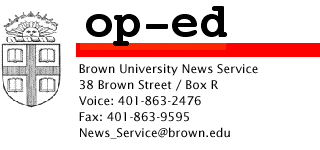

|
Distributed September 24 2001 Copyright ©2001 by Kenneth R. Miller |
Op-Ed Editor: Mark Nickel About 850 Words | |
|
Kenneth R. Miller The Most Dangerous Man in America? To dedicated opponents of evolution, the battle against Darwin is never-ending. Well-funded critics of evolution will fulminate against this week’s NOVA series on evolution, but their charges of “false” statements about the genetic code show only the emptiness of their so-called “evidence” against Darwin. There’s a dangerous man on TV this week, and in the eyes of some he presents a clear and present threat to the American way of life. His first name, however, isn’t Osama, Saddam or Abdul. It’s Charles. Charles Darwin. NOVA, PBS’s award-winning science series, is airing eight remarkable hours of television this week on the modern implications of Darwin’s theory of evolution. It’s a great series, described by Timothy Goldsmith in Science magazine as “timely and useful,” but it’s also the object of fear and loathing by the anti-evolution movement. No matter, as Goldsmith pointed out, that many of the arguments of the anti-evolution movement “are hollow echoes from the 19th century,” Darwin’s power to stir men’s souls remains so great that his ideas are feared even today. Examples? Well, the anti-evolution folks at the “Discovery Institute” in Seattle are so upset that they’ve created a Web site that attacks each and every program and just about every scientist featured in the series. The series, they charge, fails to “present accurately and fairly the scientific problems with the evidence for Darwinian evolution.” As proof, they’ll sell you a “Reader’s Guide” to the series that details a slew of scientific “errors,” “mistakes” and “misrepresentations.” Powerful stuff – until, of course, you actually read it. Then it gets downright funny. Let’s suppose, for example, that last night you had watched a PBS history special, a program noting that America and Canada share a common tongue with their one time colonial ruler, Britain – a language called English. The next morning, a critic attacked the program as filled with historical “misstatements, errors and omissions.” His evidence? The statement that these countries share a common language. In Canada, he points out, the word “color” is spelled as “colour!” And in Britain, he fumes, they call trucks “lorries.” These different words show that the claim of a common language is simply “false.” PBS is misleading its viewers! Believe it or not, that’s one of their principal scientific criticisms of the PBS Evolution series. According to their “Guide,” the series producers make a “false claim” by telling viewers that all living organisms share a common genetic code. This just isn’t true, according to Discovery Institute “scholars,” who claim that it is just one example of the ways that the overwhelming majority of scientists around the world attempt to mislead the public to support the “false” theories of Charles Darwin. Makes you wonder where these folks have been. Living organisms do indeed share a universal genetic code, a language in which 3-letter instructions written in DNA are translated into strings of amino acids, the building blocks of proteins. All living organisms translate the code using ribosomes, tiny protein-building factories, and they all read it in the same direction, 3 letters at a time. It is indeed true that in some organisms, a handful of the “words” have different meanings. Our own cells, for example, contain little structures known as mitochondria in which four of the 64 words have different meanings from the “standard” code. In most organisms, these differences are so slight as to be trivial. In common molds, for example, the sequence “UGA” is translated into the amino acid tryptophan. In the standard code, it’s a “stop” signal. The other 63 words, however, are identical between humans, elephants, daisies and molds. What does all this mean? As evolutionary biologists were quick to realize, slight differences in the genetic code are similar to differences between the dialects of a single language. The differences in spelling and word meanings between American, Canadian and British dialects reflect a common origin. Exactly the same is true for the language of DNA. Forty-eight of the 64 words are identical in all living organisms, and only 16 are known to vary across the enormous diversity of living things. Moreover, these slight variations document the evolution of the code itself from a common ancestor, a process that Charles Darwin elegantly called “descent with modification.” In fact, the entire biotechnology industry is built upon the universality of the genetic code. Genetically modified organisms are routinely created in the lab by swapping genes between bacteria, plants, animals and viruses. If the coded instructions in those genes were truly as different as the critics of evolution would have you believe, none of these manipulations would work. For better or for worse, they do work, and they work brilliantly. Today, with the DNA sequences of scores of organisms in hand, the role that evolution has played in shaping all living things, including the human species, is clearer than ever before. To dedicated opponents of evolution, however, the battle against Darwin is never-ending. No doubt the well-funded Discovery Institute and Evolution’s other critics will fulminate on the sidelines, but their charges of “false” statements about the genetic code show nothing so much as the emptiness of their so-called “evidence” against Darwin. I can’t wait to write my friends in Canada and Britain about the series, although I’ll need a translator. After all, according to Darwin’s critics we don’t share a common language with those “blokes,” do we? Eh? Kenneth R. Miller, professor of biology at Brown University in Providence, R.I., is featured in the first episode of the NOVA series on evolution and was a scientific advisor for the series. He is the author of several widely used high school and college textbooks as well as the popular trade book, Finding Darwin’s God. ###### | ||